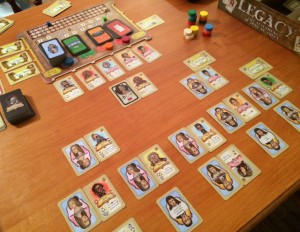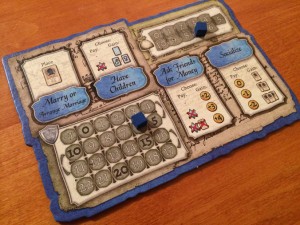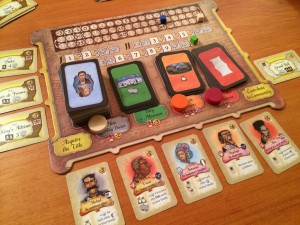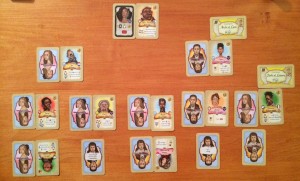Review: Legacy
Posted by James (admin) on April 10th, 2014

Legacy (or Legacy: Testament of Duke de Crecy to give it its full name) is a very innovative game where players try to create the most successful 18th century family starting with a single family member. Each round, players use their actions so that the current generation can get married, have children, buy mansions, start business ventures, arrange marriages for their children, etc. After a fixed number of rounds, the children grow up, any arranged marriages take place, and they become the current generation. Players then use actions for this new generation to get married, have children, etc. After the 3rd generation’s actions, the game ends and the player with the most points (Honour) wins.
Each player has an income track which earns cash each round, and a prestige track which earns Honour each generation. Players also earn Honour for having children, fulfilling objectives on their Patron card, fulfilling missions, as well as from friends marrying into the family, acquiring titles, etc. Plus, players must constantly manage their cash and friends – Friends are cards in a player’s hand each showing their sex, nationality, occupation, benefit when married into your family, and marriage cost (some generate cash as they come with a dowry). The nationality and occupation of these friends are important for scoring, depending on your objectives, plus certain types determine the size of the benefit a new friend that marries into the family delivers, i.e. one friend may give cash based on how many artists are already in the family, or give you an extra action disc for a specific action if the family contains another Spaniard. Not only do you want to marry the right friends into your family, but you need to get these friends into your hand before another player takes them.

There is a lot to balance in Legacy and you never feel you have enough actions to achieve everything you want to. You may only start with one family member, but the first generation only get 2 rounds of play (usually 4 – 6 actions) so there’s little room for ineffective actions. One element that helps you is that the actions on each player’s board can be used multiple times by that player; whereas, only one player can use the actions on the main board each round – so you can always perform the main actions, although your actions can only affect the current generation.
The actions are brilliantly thematic. For example, if you want to gain friends you can get one without cost, but gaining more in a single action (as actions are precious) requires spending some money. Likewise, you can ask friends for money but you’ll lose honour and maybe a friend if you ask for more than a small amount. Gaining a title usually costs you friends and money. Going into business may increase your income but it’s not what gentry do so will cost you friends and honour. This also means gaining one element quickly means burning another.
As a result, there is a lot to balance in Legacy and never enough actions to do it. Obtaining the right friends to marry into your family is very important as a good combination delivers great synergy. Also, you also need to balance having lots of children who are married to a wide variety of people against having fewer children who are married to people that combine more effectively and have spent actions to gain titles, missions, mansions, etc.

The main board tracks rounds, generations, total points, and contains the common actions along with their cards. The 5 cards at the bottom are the current friends that can be acquired too.
It’s surprising that direct interaction between players is fairly limited apart from using a main board action, or buying something, before another player can. This definitely adds a feeling of urgency to the game, but it can feel indirect and a bit like you’re each playing a separate game. However, it’s already tricky enough to balance your plans, so further effects on you by other players would likely be almost impossible to balance.
With each player performing only one action on their turn, the game moves quickly. It’s tempting to spend your downtime (which isn’t very long) thinking about your plans, but it’s worth watching other players’ turns too to see how their family is growing and what story it is telling just to feel more of the theme.
Not only does the main board show the actions any player can use but it also does a good job of tracking which phase of which round of which generation you’re on.
Some elements of luck have been reduced and incorporated into the gameplay. For example, you can pay extra when having a child to choose male or female (as you may have a hand of female Friend cards so another daughter will not be useful). You can also choose friends from up to 5 on display rather than drawing them at random. However, luck can affect your game when a specific type of friend you want doesn’t appear for ages (or appear but always gets taken before your action). Also, the mission cards can earn some decent Honour but there’s some luck if what you draw fits with your current family’s strengths or not. This wouldn’t matter so much if using an action to get a mission wasn’t so precious. Maybe the luck in drawing missions could be reduced by drawing 3 mission cards, discarding 1 by choice and then 1 at random (so they’re not always perfect but have a better chance of being useful). Alternatively, maybe allow mission cards to be placed under your Patron card (which activates other objectives) in earlier rounds (as that’s only currently allowed in the final generation).
I would have liked a little bit of variety on the mansion and business venture cards (as they’re all the same) and a few more titles and community cards (as you always use all of them). I think the free expansion at Essen added mansions with different benefits already.

My family after a single-player game. Arranged like a family tree, each row is a generation and children are positioned below their parents.
It’s worth highlighting the single-player game too. It can be played as normal which is played almost the same as the full game but some of the main board actions are blocked determined by the friend cards currently on show. However, there is also a version where, rather than build a family from the top-down, you work from the bottom-up. You start with ‘you’ and discover your own family tree – the anonymous children cards get replaced with the friend cards as you reveal who they were . I have yet to play this version but I’m looking forwards to it. It adds some hint cards which give you information about your family tree which will earn your Honour if you make them true, uses different but similar actions to the regular game, and your actions can affect any generation.
Overall, Legacy is a worker-placement game at heart but feels bigger because it’s building the family tree-hierarchy by placing cards that really defines the game. Plus, it’s less focused on claiming actions before other players do, but timing and balancing resources are still critical. There’s a lot to think about and lots of decisions to be made, especially for what is a relatively short game.
James.
[Played with 1, 2 and 4 players]


April 15th, 2014 at 2:27 pm
Small nitpick but it’s simply “Legacy (Testament of Duke de Crecy )” so without the “The” 🙂
April 15th, 2014 at 2:32 pm
Hi Waut,
Thanks. Good call. I’ve updated the page (apart from the folder name in the URL as that would break links to the post).
Cheers,
James.
April 15th, 2014 at 2:36 pm
I updated the Preview I wrote too and I now see where I got ‘The Legacy’ from – it was the title on the initial mock box cover before Essen.
https://metagamesblog.thegamemechanic.com/2013/10/15/spiel-2013-preview-the-legacy/
Thanks for letting me know.
April 15th, 2014 at 7:11 pm
[…] by any chance you haven’t played Legacy yet (why?!) here are two new reviews of the game, one written and one […]